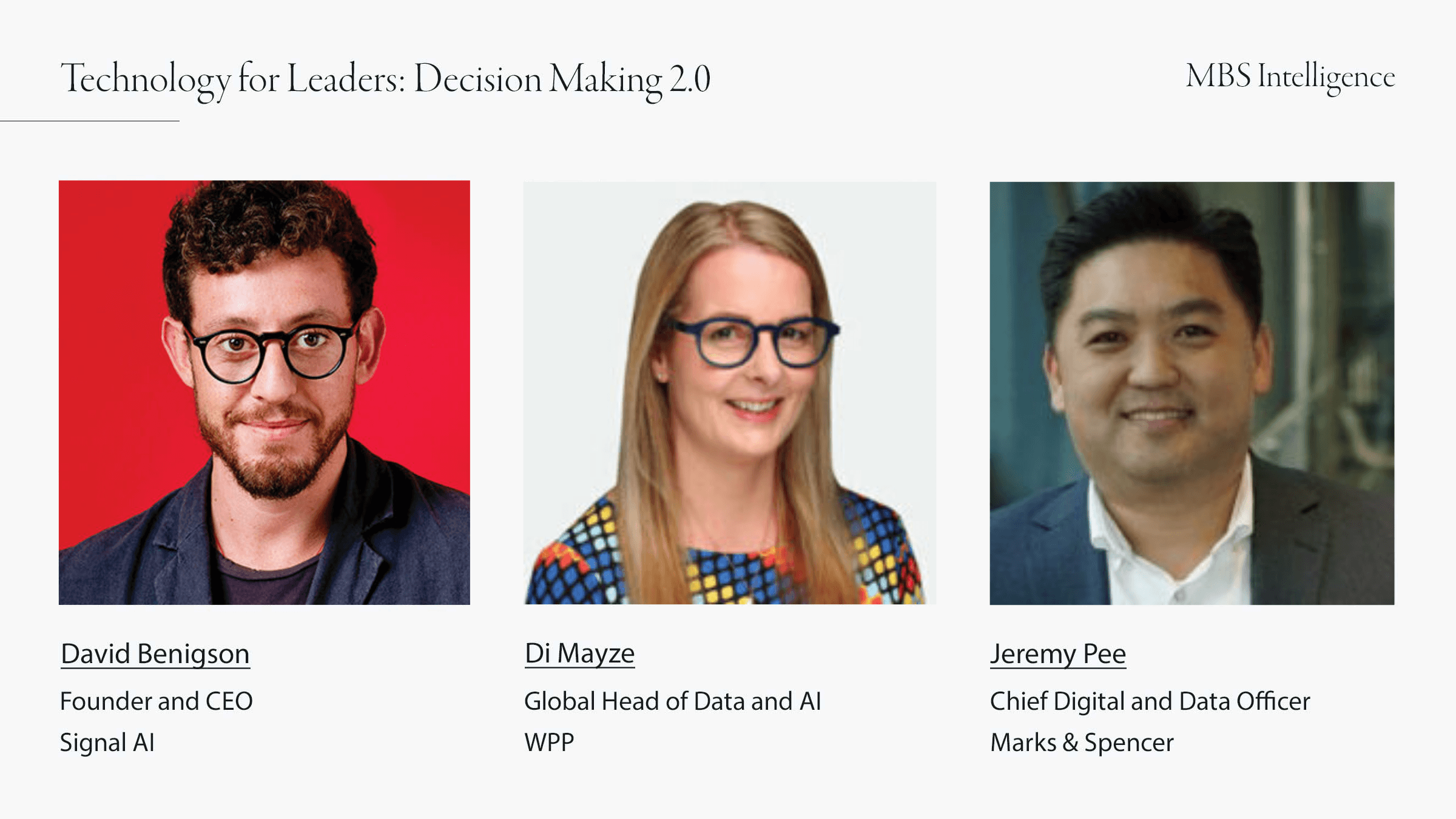Earlier this week, it was a privilege to partner with Signal AI and Tortoise Media for an event looking at the way we make decisions, and how technology – in particular data and AI – is impacting how businesses run in today’s world. It was enlightening to hear from the leading voices in data and AI, spanning across multiple continents and sectors.
The afternoon kicked off with a keynote speech from Dr Vivienne Ming, one of the tech world’s most exciting thinkers and change-makers. “For me,” she began, “AI stands not for ‘artificial intelligence’, but for ‘augmented intelligence’ – in a very deep and technical sense. As much as I geek out about self-driving cars, what I’m really focused on is how technology can enhance our actions and decision-making to make better people.”
“As much as I geek out about self-driving cars, what I’m really focused on is how technology can enhance our actions and decision-making to make better people.” – Dr Vivienne Ming
Vivienne shared a series of fascinating anecdotes demonstrating how data and AI has changed how people think about, and solve, problems. From creating a tool to monitor her own son’s diabetes to building a system which allows family members to be reunited in refugee camps, the stories were a compelling reminder of the transformative power that data and AI can play in our lives.

Specifically, Vivienne’s examples showed that the most exciting developments in AI may not be related to automation, but rather to how data can be leveraged to solve the most fundamental human problems. “There are things worth automating,” Vivienne explained, “but AI is going to have the most impact on creative workers. Now we can take this technology, augment our own intelligence, and deepen our understanding of the world.”
Similar themes were explored in Adam Sharp’s keynote speech. Adam, Former Head of News, Government, & Elections at Twitter and currently President & CEO of The National Academy of Television Arts & Sciences, which runs the Emmys, spoke on the power and importance of authenticity when harnessing and measuring data. “AI,” he posited, “can lead us to the most authentic parts of how we live.
“When the anthropologists of the future discuss the progress of humanity, I think that they will talk about us in terms of our relationship to data and how we use data to make decisions – in culture, commerce and politics,” he suggested. Adam proposed that we are in a third ‘age’ of our relationship with data. The first, he said, was a simplified existence, with little data, in which success was measured by how things felt, rather than numbers or metrics. “If you take entertainment,” he explained, “the metric was whether the audience launched, cried or clapped.” The industrial revolution waved in the second ‘age’, Adam explained, bringing globalisation and data at scale – but at the expense of humanity and warmth.
“What we’re seeing now is the emergence of ‘warm data’. We’re looking beyond the numbers to measure how people really feel about something.” – Adam Sharp
“What we’re seeing now,” he told the listeners, “is the emergence of ‘warm data’, where we’re looking beyond the numbers to measure how people really feel about something. Take the movie industry as an example: finding out how many times a film is quoted online, or how many internet memes are spun out of it, is more predictive of the longevity of a franchise than box office revenue.”
For business leaders, the critical step is finding the humanity in the data they collect. “It’s not about finding new ways to ask the same questions,” said Adam, “but challenging the questions that we’re asking.”
Following the keynote speakers was a panel of leaders discussing how data and AI is used to drive efficiency, generate revenue and improve customer experience in businesses, moderated by Alexandra Mousavizadeh, Director of Tortoise Intelligence and Founder of The Global AI Index.

David Benigson, CEO at Signal AI, opened the conversation by reflecting on the impact of the last year: “there’s definitely been an inflection point,” he said, “and we’ve seen a seismic shift in digital and data adoption.” David shared a number of examples of how leaders are using applied AI in their organisations:
“One example is Danone, which used machine learning systems to improve demand forecasting around food waste. These systems led to a 20% reduction in forecast errors, a 30% reduction in lost sales and 50% reduction in workload.” Another compelling example came from Signal AI itself, which, at the outset of the pandemic, provided guidance to international retailers about when to implement store closures, based not on regulation but on the reputational impact of that decision.
While it’s clear that today’s business leaders are enthusiastic about leveraging data in their organisations, many struggle to know where to begin. “A recent report published by Signal showed that 80% of leaders feel that they have ‘too much’ data to weigh into decision making,” said David.
Di Mayze, Global Head of Data and AI at WPP, furthered this point, telling the audience that one of her priorities is changing clients’ mindsets away from ‘big data’. “There used to be the assumption that more data was better,” she said, “but people are now realising that small, slow, curated data – combined with great questions – is far more valuable. That’s made a difference for us at WPP. We talk about data variety, not volume, as being our superpower.”

Jeremy Pee, Chief Digital and Data Officer at Marks & Spencer, shared with audience some of the ways that M&S is utilisng data to enhance customer experience. “As a brand, we have great assets,” he began. “Customers really trust us, which means our open, click through and conversation rates are some of the most advanced out there. The challenge for us is how to use this data to deepen our relationship with the customer, providing seamless and personalised experiences for them.” Jeremy explained how M&S has used its data to offer unique experiences to customers, and also support internal decision making, around things like promotions and mark down strategy.
Certainly, the role of data in decision making is continuing to evolve at pace. Organisations across the public and private spheres are beginning to see the value in a curated, targeted and altogether more human approach to machine learning and AI, rather than a singular focus on ‘big data’. One point from this Leadership Summit that has stuck with me most of all is our ability to overestimate the short-term capabilities of AI, and underestimate its long-term transformative potential. For all organisations – whether jostling for position as a global leader or at the beginning of a digital transformation programme – thinking carefully about who oversees data and AI is critical. I came away for this event feeling inspired and excited for the future, and more aware than ever of our responsibility to future generations.
Moira.benigson@thembsgroup.co.uk | @MoiraBenigson | @TheMBSGroup








